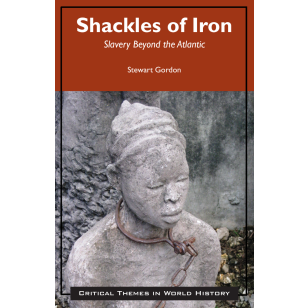Shackles of Iron: Slavery Beyond the Atlantic
Series: Critical Themes in World History
"Gordon’s survey of the topic makes it clear that slavery in the Americas can be understood much better if we put it in this larger context, in terms of both time and place. His chapters on East African and Mediterranean slavery are especially valuable, since these were contemporary with so-called Atlantic slavery and can provide students with valid points of comparison, revealing both the similarities and the variable nature of early-modern bondage. The final chapter is especially timely, reminding readers that much of what we think of as enslavement hasn’t really gone away, but simply slipped below the radar of the world media. All in all, Gordon makes it clear that, though it has arisen in different guises and at many different times and places, slavery has been and remains deeply rooted in human society. A rewarding introduction for anyone looking to better understand slavery as a world-wide institution."
—Robert Davis, The Ohio State University
eBook available for $15.50. Click HERE for more information.
"Gordon’s survey of the topic makes it clear that slavery in the Americas can be understood much better if we put it in this larger context, in terms of both time and place. His chapters on East African and Mediterranean slavery are especially valuable, since these were contemporary with so-called Atlantic slavery and can provide students with valid points of comparison, revealing both the similarities and the variable nature of early-modern bondage.
"The final chapter is especially timely, reminding readers that much of what we think of as enslavement hasn’t really gone away, but simply slipped below the radar of the world media. All in all, Gordon makes it clear that, though it has arisen in different guises and at many different times and places, slavery has been and remains deeply rooted in human society.
"A rewarding introduction for anyone looking to better understand slavery as a world-wide institution."
—Robert Davis, The Ohio State University
"For readers who equate the 'institution' narrowly with the Atlantic trade and the cotton-growing industry in the antebellum American South, this short introductory text broadly and viably sketches the ubiquity of slaving throughout world history. Gordon emphasizes the paradoxes of slavery and freedom thriving together in ancient Athens, the large and long-running trades from Africa across the Red Sea and around the Indian Ocean, and the reciprocal Christian-Muslim Mediterranean raiding for captives from the sixteenth to early nineteenth centuries.
"Each section includes four interestingly varied primary sources selected to provoke group discussion. Shackles of Iron offers instructors a lot to work with in a compact, accessible format."
—Joseph C. Miller, Emeritus, University of Virginia
"This book does justice to the teaching of slavery not only as a past event but also as a contemporary event that is embedded in the cultures of many modern societies."
—Godfrey Vincent, Tuskegee University
"I am so impressed with this book that I have just now canceled a textbook order for another work which I had planned to use, and instead will order the paperback edition of Shackles of Iron. I like the breadth of coverage, from Athens to Swahili Coast to North Africa to Modern Slavery, and the choice of primary sources for each of these four chapters will help students to see the complexity of slavery in a world-historical context.
"The scholarship is laudable and the paperback price is reasonable (less than $20)."
—Douglas Chambers, The University of Southern Mississippi
"This is a well-conceived volume overall, and should prove exceptionally valuable in the classroom for its brevity and clear, thoughtful structure. Gordon offers an important and powerful collective to standard western depictions of slavery as essentially an Atlantic phenomenon. His translation is admirably concise, and the prose is appealing and accessible to undergraduates. I am particularly impressed by his organization of his material into four non-Atlantic case studies. Pedagogically this is an excellent approach to shifting the readers’ focus beyond the Atlantic.
"Furthermore, the volume's great value in the classroom is enhanced by the generous number of carefully selected primary source passages in each chapter. The balance between Gordon's own text and source material makes the organization of group discussion in class much easier.
"The up-to-date and representative bibliography is another attractive feature of the volume."
—Garish Bhat, SUNY Cortland
"[L]ays bare the universal nature of slavery throughout history, including in the modern era.
"Due to its brevity and impressive coverage of slavery in a global context, this text is well suited for undergraduate college courses, especially since each chapter is accompanied by a list of 'Questions for Consideration' that challenges the reader to inquire deeper into slavery's historical context. As such, the text will be very effective in world history surveys and seminars on slavery. Positing slavery as a historical human condition, Shackles of Iron succeeds in furthering our understandings of slavery beyond the typical images of the Atlantic world. It forces readers to reconsider notions of human rights in relation to slavery's contemporary forms as well."
—World History Connected
"Text is clear, concise, understandable, but very concrete. Excellent integration of select primary sources. Excellent integration of select primary sources. Thoughtful consideration of topic that is good for both survey (non-major) and upper-division (majors) course."
—Elizabeth Propes, Tennessee Tech. University
About the Author:
Stewart Gordon is an Independent Scholar long associated with the Center for South Asian Studies at the University of Michigan.













